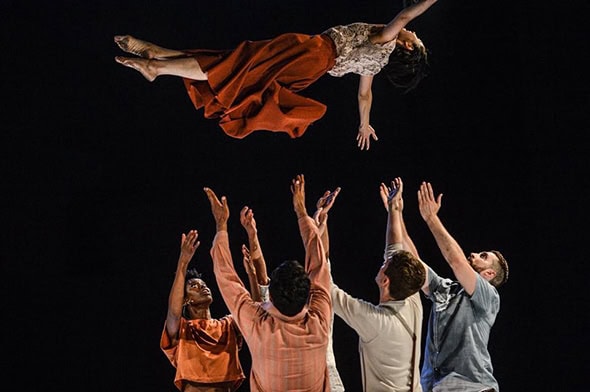Protein Dance in Border Tales at Ramallah Contemporary Dance Festival
Posted: April 10th, 2019 | Author: Nicholas Minns | Filed under: Festival, Performance | Tags: Andrew Gardiner, Anthar Kharana, Eryck Brahmania, Kenny Wing Tao Ho, Khaled Elayyan, Luca Silvestrini, Protein Dance, Ramallah Contemporary Dance Festival, Stephen Moynihan, Temitope Ajose-Cutting, YuYu Rau | Comments Off on Protein Dance in Border Tales at Ramallah Contemporary Dance FestivalProtein Dance, Border Tales, Ramallah Municipal Theatre, April 7

This is the first of a series of articles and reviews from the Ramallah Contemporary Dance Festival to which I was very kindly invited by its director, Khaled Elayyan and his team.
Following the appearance of Protein Dance in LOL at Ramallah Contemporary Dance Festival in 2012, the company’s artistic director, Luca Silvestrini, returned to the region as part of his research for a new work on the subject of refugees and identity. As he writes in the program note, ‘I’ve travelled across England, Slovenia, Denmark, Spain, Germany, Palestine and India and learned that there’s a common, complex and unresolved space between people. This emotional, sometimes physical, sometimes socially awkward space is strongly influenced by a restless collision of cultures, traditions, religious views and political interests. I see this space in between as a border, the outer part of all of us; a fragile partition that defines who we are and perpetuates a yearning to belong.’
This notion of an ‘unresolved space between people’ has gained in relevance since Border Tales was first created in 2013; its implications have taken on a heightened relevance with the Brexit issue alone. Watching the performance recently in Ramallah adds a level of poignancy because of the continuing illegal expulsion of Palestinians from their former homes by ‘settlers’ of an occupying, predatory state, forcing them to live as refugees in their own country (what an odd irony that EU citizens seeking to remain in the UK are required by the Home Office to register for ‘settled’ status). Choosing to program such a work in Ramallah is evidence of the uncompromising view of the festival organizers that the dance body is not only personal but political.
Silvestrini’s cast — Temitope Ajose-Cutting, Eryck Brahmania, Andrew Gardiner, Anthar Kharana, Stephen Moynihan, Yuyu Rau and Kenny Wing Tao Ho — is a microcosm of society in the UK’s current post-colonial makeup. Andy (Gardner) throws a neighbourhood party to which they are all invited; his pivotal role in provoking their tales of social and cultural assimilation through his cheerfully blithe ignorance of their mores — and his willingness to ascribe to them stereotypical qualities — demonstrates the devastating vulnerability of multiculturalism (see also Lloyd Newson’s treatment of this topic in DV8’s Can We Talk About This?). There is, however, no calculated offence in Andy’s buffoonery; like the traditional clown, he holds up a mirror for us to check our own tendencies.
By using the cast’s self-deprecatory awareness within his satirical framework Silvestrini disabuses us of some of the more ingenuous barriers to mutual respect and understanding. Within this framework he allows his cast to clarify their own feelings and values in both text and dance and particularly in the latter — to Kharana’s uplifting musical accompaniment — we begin to see a communal self-expression emerge within a multi-cultural group. And while the perspective of Border Tales is distinctly British, the depiction of a ‘restless collision of cultures’ can be recognized in any society where immigration, whether forced or welcomed, is an acknowledged strand of government policy. One reason Silvestrini has revisited Border Tales is what he sees as today’s ‘more divisive and intolerant co-existence’ that underpins much of the current Brexit debate. Andy devises a simple skipping pattern for his guests to the refrain ‘in and out, in and out’ to which he adds with a gleeful laugh, ‘Leave, remain, leave, remain, open the gates, close the gates…’ His mood of benevolent gaiety is nevertheless tested when Wing asks for his advice on how to become ‘more English’. Andy has no advice to offer so Wing begins to copy him, at which point Andy pushes him back with the incensed injunction: ‘Don’t take my job away!’
When all the guests have left at the end of the party, a confused and overwhelmed Andy sits down next to the cheerfully buoyant ‘welcome’ balloon to ponder, like the audience, what has just happened. How you react to his pathos depends on where you stand on the causative history of British colonial policy. Border Tales can be seen as a damning critique of British mentality, a sympathetic appreciation of immigrant struggles and a superimposed series of finely honed, well-paced tales that attempts to resolve ‘the space between people’. But when, as a UK citizen, I read about how the British government set up the establishment of Israel under the terms of the Balfour declaration in 1917 only to turn away from the continuous dismantling of its spirit; how it left the Indian empire to its fate in 1947; how it has recently treated the Windrush generation of immigrants and how it is in the throes of trashing its relationship with Europe, Andy’s role offers a salutary reflection on what constitutes our ‘borders’.